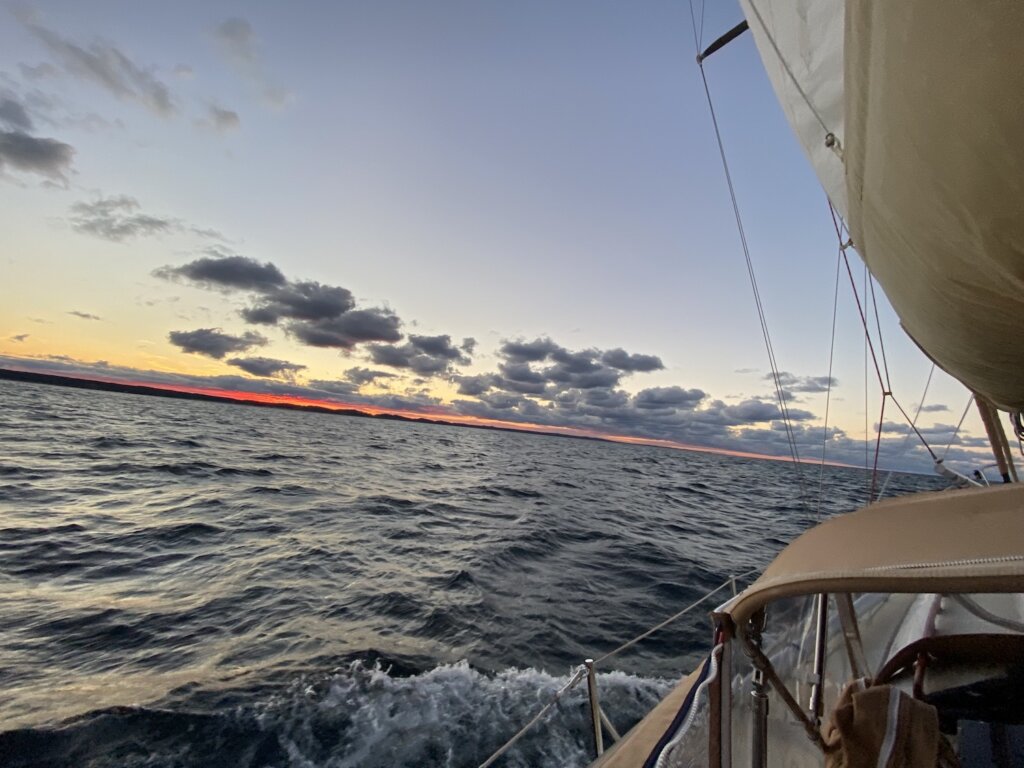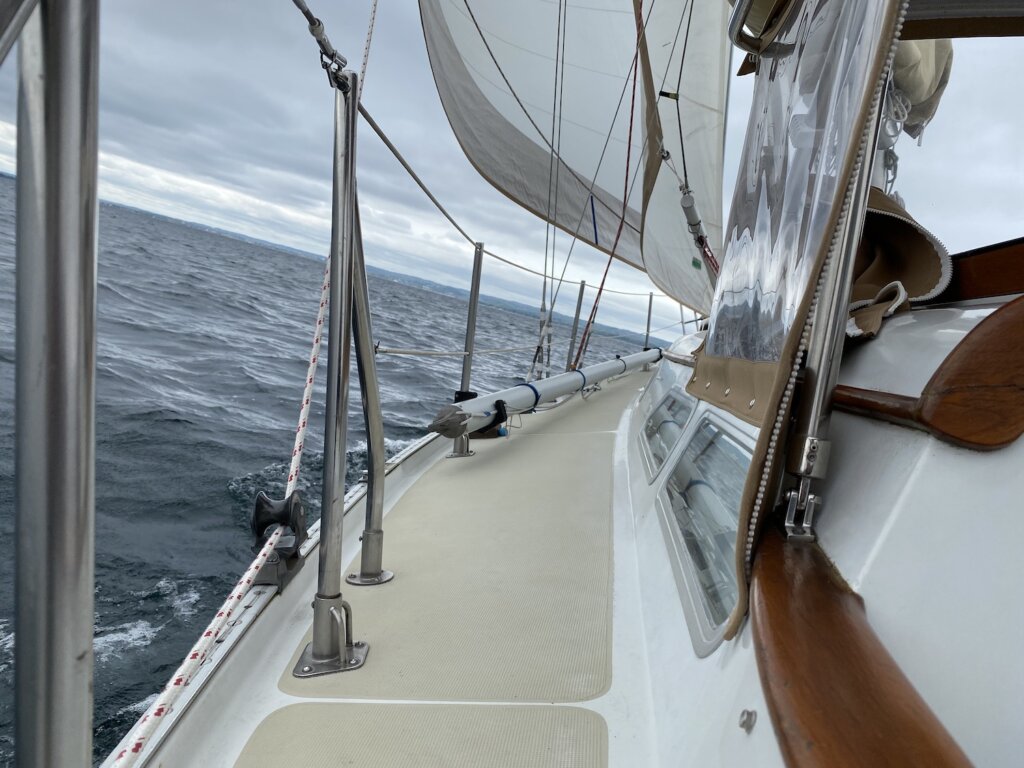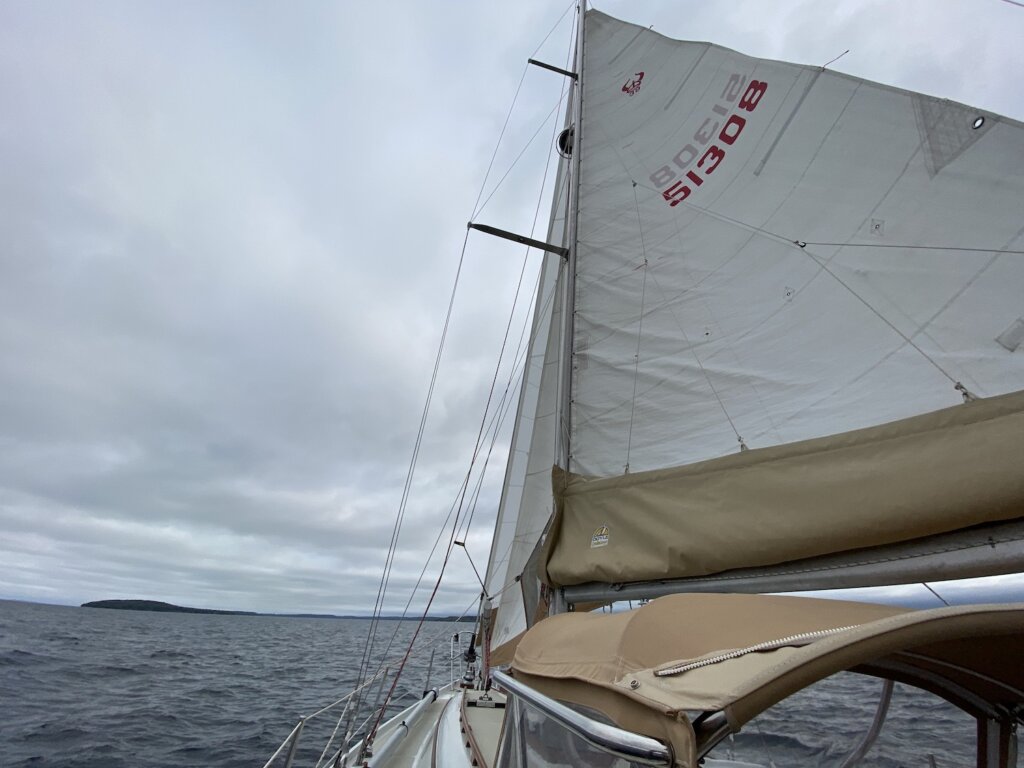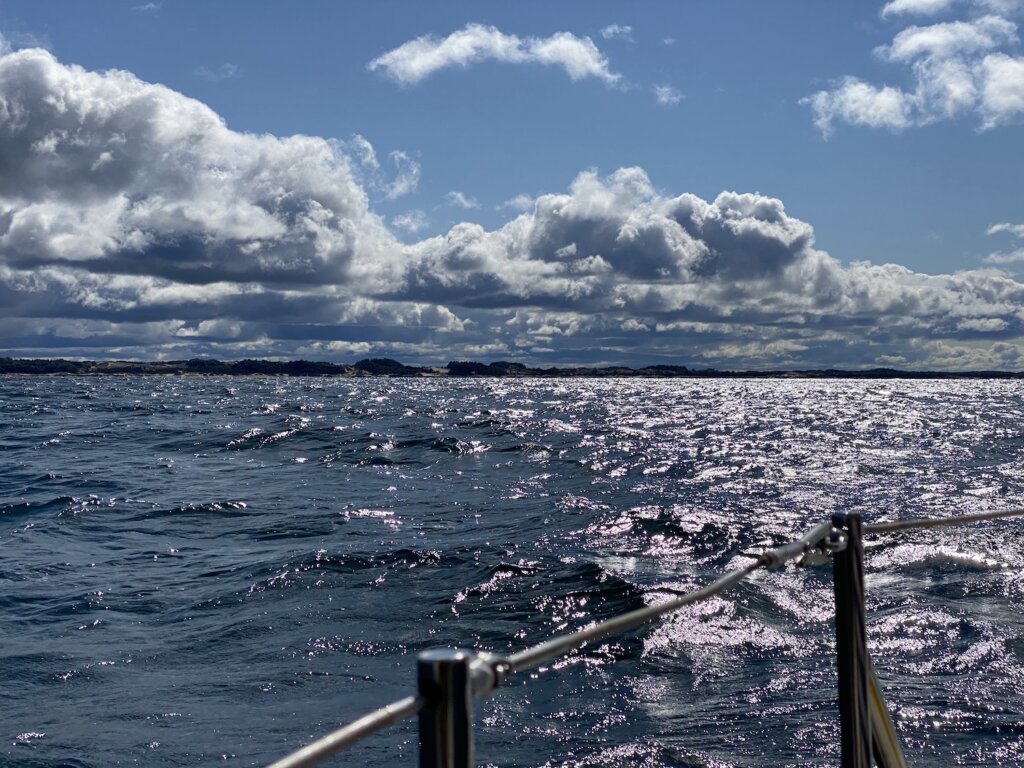We bought our boat in Bower’s Harbor, on Old Mission Peninsula near Traverse City Michigan but we live near Grand Rapids Michigan. So once the purchase was complete we needed to get the boat closer to home. Our timing wasn’t perfect since we officially owned the boat at the end of September. But we decided to sail down the first weekend of October. We went from Bower’s Harbor marina to Muskegon which is approx 176 nautical miles.
For more details on how our first big sail went check out our post here: Sailing Bower’s Harbor to Muskegon
This is the post where we tell you all the lessons we learned so you can learn from our experience and our mistakes:) We do not claim to be experts right now but here is what we learned:
1. Communication is critical
You need to make sure everyone is on the same page, especially when you are learning or have a crew on board. You may want to start planning a tack or jibe several minutes before you need to. Make sure everyone knows the goal of the maneuver, their specific job, and what needs to happen before we can start it. It is better to over-communicate to minimize confusion.
2. Make time to talk about what went well, what didn’t, and what we could try to do differently in the future.
This is a new boat for us, so everything is a bit foreign. Every time after docking, I want to know what the crew’s perception was of the approach, speed, fender location, etc. so we can improve it in the future. It helps to approach it constructively, not critically: “how can we improve X” instead of “we messed that maneuver up”
3. Using a preventer line is super helpful when on a run
We would have had several accidental jibes while on a run on day 2 without that on

4. Take your time
As new sailors, tasks aren’t second nature yet, if you try to rush and get anxious you won’t be thinking as clearly. For example, I tried to pull the halyard as you do when raising the mainsail as I was trying to lower it. I was exhausted from the day and I could not at that moment figure out that I just needed to ease the line out to lower the sail.
5. Having an extra set of hands can be helpful but be mindful of who you invite.
We would recommend someone you know and are comfortable with (especially if you are going on a longer trip). If you are new to sailing it can be stressful and frustrating at times so having someone you know can handle that and not take things personally is helpful. Someone who has any on the water experience or sailing experience is also great. You want someone who will be willing to take on jobs, learn new skills and be helpful to you.
6. Explaining sailing to your guests
Some people will want to learn more than others. Even if your guests aren’t interested in learning to sail they still need to know a few things. Telling them in general what the lines that are in the cockpit do is helpful so they know at the very least to stay out of the way of those lines and not to pull on them or adjust them.

7. It is exhausting at first
We had a great time on this trip but we will not deny that it is very tiring to sail for 12+ hours at a time. As you gain more experience it likely gets easier but at first, as we have said, things aren’t second nature so you are thinking through every move. We knew this was a huge undertaking for one of our first sails but we had to get the boat back to where we live.
8. Autopilot is a necessity!
We have an old ray marine steering wheel-mounted autopilot that we have named “Old Ray”. Old Ray worked okay when we were motoring on day one with no wind or waves. With wind and waves, our autopilot couldn’t keep up so we had to hand steer. Hand steering is very tiring in the wind and waves, it takes more effort than you might think to keep the boat going straight. We are planning to upgrade our autopilot in the next year before setting off on our next big sailing trip.
9. Boating/on the water experience is beneficial
We were power boaters before we bought our sailboat. We had experience in waves and changing conditions in lake Michigan. We also had two sailing lessons with friends on their boat in Lake Michigan. It is crazy how much you can learn and pick up on in a few lessons if you are really motivated to learn. On top of our lessons with friends, we did buy the ASA 101, 103, and 104 books. The additional reading helped everything sink in. Our point here is even if your on the water experience isn’t specifically sailing experience it will still help you. Your overall comfort on the water and understanding of water, waves, and weather is something.

10. Don’t psych yourself out
Sailing, specifically taking a long journey on a boat for the first time is daunting. It can be really scary and make you anxious. It is easy to psych yourself out! But stay calm, plan your trip ahead of time, review the steps and any necessary obstacles that you know about. When you are on your trip, take it one step at a time, think about what you are doing at each given moment instead of the big picture. Once you are out there and the only things that matter are the boat and the water and where you are going it is honestly really nice! The rest of the problems and stressors you have in your life on land all fade away.
11. Don’t be afraid to try new things
Sailing on our own was new to us on this trip. On day two we were on a run all day, going as close to directly downwind as we could. The wind was too high for the asymmetrical spinnaker so we tried to sail wing on wing. We tried twice throughout the day and both times we just couldn’t get it to work. So we retrimmed our sails and just kept going. Yes, it didn’t work, and we still aren’t 100% sure what we should have done differently to make it work. But you never know until you try and you can learn a lot from mistakes and things that didn’t go well. As long as you know you can keep yourself, your crew, and the boat safe it’s okay to try!
12. Pack food that is easy to eat
When the water is flat and there is no wind it is easy to eat whatever type of meal you want. When the water is wavey, the wind is stronger and the boat is heeling over it makes relaxing for a snack or a meal a challenge. It might be going along okay and you may think you have some time. But you might have an accidental jibe or you may need to tack or jibe or do something to adjust the sails at any point. Bring food that can be prepared quickly and that you can easily set down and pick back up as needed.

One of the best things a long trip like this can give you is confidence in yourself and in your boat. After three days of living on SV Resande, we feel way more comfortable! After all, the best way to learn is to get out there and do it! You will never know everything and there will always be something to fix on your boat. At some point, you just have to go!
Any tips/tricks you have learned from your sailing experience? Questions? comments, leave them all below!